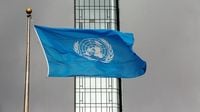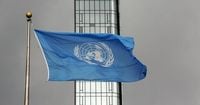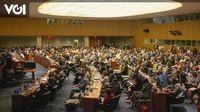Artificial intelligence (AI) took center stage at the United Nations’ annual high-level meeting this week, marking a pivotal moment as world leaders and diplomats placed the fast-evolving technology among the most pressing global challenges. On September 24, 2025, the UN Security Council convened an open debate, focusing on both the promise and peril of AI—its potential to transform societies for the better, and its risks if left unchecked.
AI’s meteoric rise began with the launch of ChatGPT about three years ago, an event that set off a technological race among major companies, each vying to develop more advanced systems. According to coverage from the Associated Press and Jakarta-based news agencies, these advances have amazed the world and spurred both excitement and anxiety. While AI’s capabilities now span everything from medical research to logistics and early warning systems, experts have repeatedly sounded alarms about existential threats such as engineered pandemics, large-scale misinformation, and the nightmare scenario of rogue AI systems running amok.
UN Secretary-General António Guterres set the tone at Wednesday’s Security Council session, stating, “The question is not whether AI will influence international peace and security, but how we will shape its influence used responsibly.” He highlighted AI’s potential to strengthen prevention and protection efforts—anticipating food insecurity, tracking displacement, supporting de-mining, and identifying outbreaks of violence. Yet, Guterres did not shy away from warning that, “without guardrails, it can also be weaponized.”
The debate reflected a global consensus: AI is a double-edged sword. British Deputy Prime Minister David Lammy praised AI’s capacity for “ultra-accurate, real-time logistics, ultra-accurate real-time sentiment analysis, [and] ultra-early warning systems.” But he also cautioned about the “challenges for armed conflict,” including “the risk of miscalculation, the risk of unintended escalation, and the arrival of artificial intelligence-powered chat bots stirring conflict.”
The international community’s response has been swift but, thus far, largely symbolic. Previous multilateral efforts—including three AI summits hosted by Britain, South Korea, and France—resulted only in non-binding pledges. Recognizing the need for more concrete action, the UN General Assembly last month adopted a resolution to create two major bodies aimed at shepherding global AI governance: a global forum and an independent scientific panel of 40 experts, including two co-chairs (one from a developed country and one from a developing nation).
This move is widely regarded as a milestone. As Isabella Wilkinson, a research fellow at Chatham House, wrote in a recent blog post, these new mechanisms are “by far the world’s most globally inclusive approach to governing AI.” Still, she added a note of caution: “But in practice, the new mechanisms look like they will be mostly powerless.” Critics worry that the UN’s slow-moving bureaucracy may be ill-suited to regulate such a rapidly advancing technology.
On September 25, 2025, Secretary-General Guterres was scheduled to formally launch the Global Dialogue on AI Governance. This forum is designed as a venue for governments and stakeholders to discuss international cooperation, share ideas, and develop solutions. The first formal meeting is set for Geneva in 2026, followed by another in New York in 2027. Meanwhile, recruitment is underway for the scientific panel, which is drawing comparisons to the UN’s influential climate change panel and its annual COP meetings.
During the Security Council debate, several leaders emphasized the importance of ensuring that AI is developed and used responsibly, particularly in the military sphere. Sierra Leone’s Minister of Foreign Affairs, Timothy Kabba, argued that the Council should “encourage best practices in peace operations, promote safeguards to retain human agency in military uses, and ensure compliance with international law and international humanitarian law.” Greek Prime Minister Kyriakos Mitsotakis urged the Council to “rise to the occasion; just as it once rose to meet the challenges of nuclear weapons or peacekeeping, so too now it must rise to govern the age of AI.”
The conversation also turned to the issue of digital inequality. Somalian President Hassan Sheikh Mohamud warned of “digital colonialism,” noting that Africa risks being left behind in the AI revolution unless there is meaningful international cooperation. Algeria’s Foreign Minister Ahmed Attaf pointed out that only 10 out of 55 African Union member states have adopted necessary information technology regulations for AI, highlighting the continent’s vulnerability and the broader challenge of digital sovereignty.
As the UN gears up for this new era of AI governance, pressure is mounting from outside experts as well. In the days leading up to the Security Council meeting, a coalition of influential AI researchers—including senior employees from OpenAI, Google’s DeepMind, and chatbot developer Anthropic—called on governments to establish “red lines” for AI safety by the end of 2026. They urged the creation of “minimum guardrails” designed to prevent “the most urgent and unacceptable risks.” This group pointed to international precedents, such as treaties banning nuclear testing and biological weapons, as models for binding agreements on AI.
Stuart Russell, a computer science professor and director of the Center for Human Compatible AI at the University of California, Berkeley, explained the rationale: “The idea is very simple. As we do with medicines and nuclear power stations, we can require developers to prove safety as a condition of market access.” He suggested that the UN’s governance could mirror the International Civil Aviation Organization, which coordinates with safety regulators across countries to ensure a unified approach.
Russell and others advocate for a “framework convention” that would remain flexible, allowing diplomats to update it as AI technology evolves. This approach, they argue, is the only way to keep pace with breakthroughs that can come at a dizzying speed.
Despite the symbolic significance of the new UN bodies, skepticism remains about their ability to effect real change. The question lingers: can the United Nations, with all its procedural inertia, truly keep up with the relentless march of AI innovation? Or will these efforts amount to little more than well-intentioned talk?
For now, the world is watching as the UN attempts to lead the charge. With the launch of the Global Dialogue on AI Governance and the formation of a scientific panel, the international community has taken a first step toward meaningful oversight. But as history has shown with nuclear arms and climate change, the path from resolution to regulation is rarely straightforward.
The stakes could hardly be higher. Whether AI becomes a force for good or a source of global instability may depend on the resolve—and creativity—of those now tasked with shaping its future.



